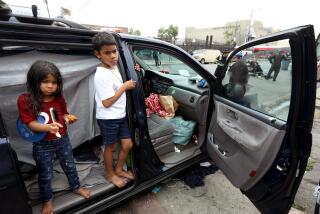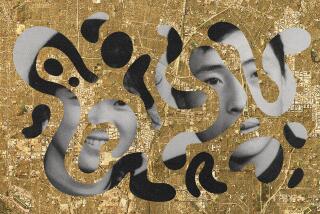Tiny, Unfurnished Office Is a Symbol of Hope for Somalis : Refugees: Group seeks to become a unifying force for the fragmented and scattered immigrant population in the Southland.
The office of the Somali Relief and Rehabilitation Assn. is no larger than a walk-in closet. It has no desk, chair or filing cabinet. Its furnishings amount to a telephone, an answering machine and wall-to-wall carpeting.
By most measures, the windowless alcove would seem nothing to celebrate about. But for a tiny refugee community from a country torn by famine and war, the freshly painted office on West 6th Street in Los Angeles represents hope--for Somalis here and those in their East African homeland.
“Everyone is calling, but we don’t even have furniture yet,” said Director Ahmed A. Dahir recently, awaiting a donation of furnishings from a soon-to-be closed branch of Security Pacific Bank. “We are right now shipping $15,000 worth of medicine to Somalia.”
Since its founding two years ago, the relief group has been bounced around from donated desks in a downtown office building to the kitchen tables of its volunteers. Until recently, the official phone number rang at the Mid-Wilshire home of co-founder Saeed Megag Samater; board members would meet in his consulting office or at the workplaces of other volunteers. Only last August was the group incorporated, and it has not yet filed its list of officers with the California secretary of state.
Still, the nonprofit group, which is affiliated with a relief effort by the same name in the disputed northern Somalia region of Somaliland, is hoping to become a unifying force for the fragmented and scattered Somali immigrant population in Los Angeles. Known as SORRA, it is funded through private donations and is one of several organizations providing resettlement assistance for refugees here and displaced Somalis in Africa.
Other groups, such as the African Community Refugee Center on Fairfax Avenue, have helped find housing, clothing and job training for new immigrants. But SORRA claims to be the only relief organization in Los Angeles run by and for Somalis, and it hopes to build on that distinction.
Fewer than 300 Somalis live in Los Angeles, according to local Somalis, but their numbers have been slowly growing with successive waves of immigration. A decade ago, Dahir said, just nine Somalis called Los Angeles home, most of them students at UCLA.
Today the population is a diverse mix of poor refugees, some of whom arrived last month and speak no English, and successful professionals who have gradually worked their way to Los Angeles after fleeing Somalia, some nearly two decades ago when it was aligned with the Soviet Union.
“The reason they come here is very simple,” said Dahir, a thin, bespectacled former Somali government official. “It is the climate. They simply don’t like the snow.”
Unlike larger Somali communities in the United States and Canada, Somalis in Los Angeles have had difficulty developing a collective identity and reliable social network. Somalis here have none of the traditional meeting places of other immigrant groups, such as restaurants, markets, clubs and social halls. Most Somalis are Muslim, but many say they do not feel comfortable worshiping at the city’s predominantly Arab mosques.
“There is no Somali community center here to assist refugees,” said Ahmed Abdiwahab, a former Somali government statistician who moved with his family to the Crenshaw district last July from a refugee camp in Kenya. “I have been lucky to meet guys I knew before in Somalia who are helping as friends. They gave us our furniture.”
In the mid-1980s, an informal community of a dozen families sprouted up in a cluster of apartment buildings near National and Sepulveda boulevards, but fighting and politics in their homeland soon splintered the group and most moved away. Today, many Somalis live in South-Central Los Angeles and the Mid-Wilshire and Fairfax districts, but no dominant neighborhood has emerged.
“It was known among us as el-gap, which is the name for downtown in Somali,” said Faisal Roble, an ethnic Somali from Ethiopia who emigrated to Los Angeles in 1981 and lives in Palms. “We would go to the Mar Vista park every Sunday and have barbecue and rice. The ladies would sit by themselves and the men would sit and talk. We’d drink a lot of tea with cinnamon sticks and cardamom.”
With world attention focused on the American-led relief effort in their Horn of Africa country, local Somalis have reaped an unexpected benefit symbolized by the new SORRA office: Their dispersed community, divided by age-old regional and clan loyalties, is beginning to look after itself as it grows closer together in crisis.
Unlike Somalis in Africa, Somali residents of Los Angeles only reluctantly talk about their clan associations, saying they have become irrelevant in a place where Somalis of all backgrounds face similar hardships. Although some privately acknowledge the enduring cultural importance of such ties, they say Somalis need to look beyond their differences if they are to survive here.
“We are talking to each other,” Dahir said. “People are coming together.”
A recent discussion on Somalia at UCLA brought together Somalis from a broad spectrum of traditionally competing clans and regions. Even though there was no agreement on solutions to some of Somalia’s most serious problems, several participants said talking about them was important in itself.
“Whatever their political differences are, they are not hateful differences,” said Edward A. Alpers, a UCLA history professor and former director of a faculty development program for Somalia’s National University.
Last week, SORRA joined two other African service organizations--together called the Coalition for African Refugees and Immigration--and moved into the Koreatown office building on 6th Street. Although the three groups have not traditionally worked together, the urgency of immigration from East Africa has brought them under one roof.
“It took a lot to bring us all together, but I told them what happened to me and said it will be worse for you,” said Saba Hile Maskel, director of the Ethiopian Community Center Outreach Service, which was established a decade ago to help Ethiopians fleeing war and famine in that country.
“People have an unrealistic expectation when they come here,” Maskel said. “They are not prepared for what it is really like.”
As of September, the United States had accepted 5,500 African refugees this year, many of them from Somalia, according to the State Department. Although the numbers pale in comparison to emigration from other parts of the world, they are large enough to present overwhelming relocation and assistance problems.
“It is not a complicated issue,” Maskel said. “We don’t want the Somalis to make the same mistakes. There is no plan right now for refugees when they get here. Even when you get a new job you need to go through an orientation.”
With the influx of refugees, SORRA has been forced to split its scarce resources between local needs and those in Somalia. Several hundred Somalis have arrived in San Diego this year under a program sponsored by the International Rescue Committee, and the Los Angeles group says it has contributed clothing and money to the immigrants.
The growing local need for assistance has made it more difficult for SORRA to pursue relief efforts in Somalia. The group recently sent donated medical supplies to Somalia, but co-founder Samater said it has not been able to collect enough money to ship two donated dump trucks to Somaliland, a region not affected by the famine and recent fighting but in need of rebuilding after years of civil war.
“We got a letter from the mayor of Hargeisa saying how badly they need them, but we need $5,000 to ship them,” he said.
With 10 board members and about 45 other members, SORRA operates on a budget of about $1,500 a month with no paid staff members. Dahir said he contributes $200 a month. Now that the group has joined the coalition, SORRA hopes to qualify for foundation grants and other funding.
But even with resources, SORRA will face obstacles posed by the political realities in Somalia. Samater, who is from Somaliland, said his organization helps Somalis in Los Angeles from all regions and clans, but there have been complaints that SORRA favors those from the north. Some southern refugees say the African Community Refugee Center has been more accommodating than SORRA.
There has also been criticism that SORRA’s overseas assistance goes only to Somaliland, the country’s northernmost region, which has unilaterally declared its independence, a move not recognized internationally.
“Our main office is in Somaliland and that is where our volunteers are from,” Samater said. “Some of our volunteers go to the south, but they don’t belong to that area, so you don’t know what will happen to them. We have a sister city organization that works in the south. If they need something badly, we go through that system.”
Even with regional rivalries, many Somalis here hope that increased international interest in their homeland will not end with the delivery of food to the starving people of the south, but will help bring a lasting peace throughout the country.
“In America if you want change, you vote; back in Africa if you want change, you kill,” said Ali Gulid, a petroleum engineer from Somaliland who voted in his first U.S. presidential election in November. “I am an American citizen now, but I still love Africa and want to help.”
More to Read
Sign up for Essential California
The most important California stories and recommendations in your inbox every morning.
You may occasionally receive promotional content from the Los Angeles Times.










